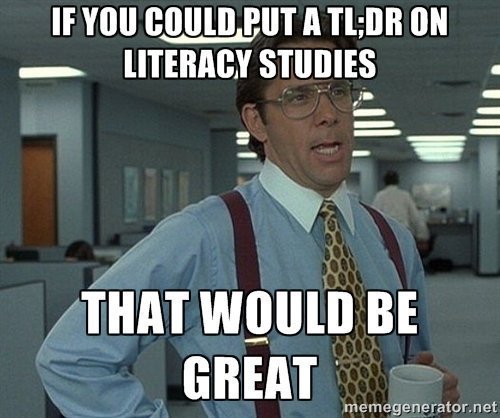
Literacy-What Is It Good For?
The answer to that is not “absolutely nothing” but happens to be EVERYTHING. Studying literacy and its practices, implementation, and its effects has really opened my eyes to the importance of understanding why and how different literacies develop and who they effect. For me personally the different case studies that we have examined have presented me with the most accurate and understandable explanations of what literacy is. Being able to place real examples and experiences next to the individuals has helped me to draw the connections between exposure, lifestyle, education, and history in a clearer manner. For example, we focused on Dora and Raymond in Deborah Brandt’s “Sponsors of Literacy” piece in my group, and mapping out the differences in their early life and familial history helped me to see the different literacies I myself was prepared to learn or given when I was younger. By examining different case studies I have learned to look more critically at my own literacy practices and ask myself “Why do I do this” and “Where did I learn this.” By relating the material back to my own life I feel as though I am gaining more confidence in the idea that I might just understand a portion of what literacy is.
The other aspect is the “social view of literacy” and what this actually means. To me this idea is growing into what I imagine as a gigantic melting pot of different ideas and adaptations including all types of human interaction. It is fascinating to me how language and writing in particular adapt and change or fluctuate throughout generations. Socially, the view of different generation’s literacy has to adapt with the new practices that are introduced as time passes, but it is in our nature to push back against these changes. For example, I remember my mother being anti-texting and getting after me in high school for texting too much. Now that I am in college and have moved away from home she finds it easier to text me and it is very rare that I get an actual phone call from her unless I instigate it. She grew up in a generation that still wrote notes to each other and had to call the house phone to talk to friends but has become an avid texter because the literacy practices around her demanded it and she had children in the generation that fully embraced texting who are/were willing to teach her the ins and outs of the process. I feel like I am rambling at this point so I digress. Moral of the story; literacy studies is confusing and I’m pretty sure it’s the rabbit hole, BUT I am enjoying falling into it even if it sometimes makes me realize that I am more like my mother than I care to admit. I guess that happens when your literacy is shaped by those around you!

 Website:
Website: